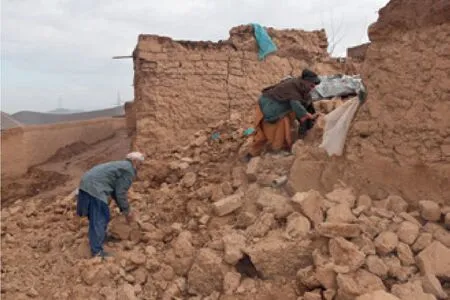When ‘Might Is Right’ Prevails
2022-03-22ByOngTeeKeat
By Ong Tee Keat
While memory across the globe remains scarred by the humanitarian disaster in Syria, another crisis looms in Afghanistan, where the nation is devastated by widespread hunger and a collapsing healthcare system. According to the UN World Food Program, only 2 percent of the Afghan population has enough food.Over 3 million children are grappling with malnutrition and another 1 million are expected to die of starvation.
The international community, under the influence of Western media, is quick to attribute the disaster to the Taliban rule following the fall of Kabul on August 15, 2021. But they remain chillingly silent on who actually crippled the Afghan economy.
Dystopian scenario
Perhaps global memory is still fresh of the speedy collapse of a U.S.-backed Kabul regime, earlier than Washington expected, last year. The return to power of the Taliban, an organization that remains on the American sanction list, triggered an asset freeze on the Afghan Central Bank’s reserves of $9.5 billion, a sizeable portion of which is in accounts with the New York Federal Reserve and U.S.-based financial institutions. By doing so, the new Taliban administration has been denied access to Afghanistan’s reserves.But the move in turn starved all Afghan banks used by local businesses and citizens of access to U.S. dollars, plunging the nation’s liquidity into immediate disarray.
Widespread poverty and a dire need for food and fuel amid the winter cold presented the world with a dystopian scenario. Almost the entire Afghan population now teeters on the brink of poverty.The rate of poverty is expected to soar to 97 percent by June from the already alarming 72 percent recorded last September, according to UN statistics.
The situation is now going from bad to worse. While the U.S.and its allies were determined to totally isolate the Taliban regime from the international financial system in the name of countering human rights abuses by the regime, the Afghan people at large are made to bear the brunt of these punitive measures.
The anticipated humanitarian crisis has since been unfolding under the close watch of the international community.
In mid-January, the UN and its partners appealed for more than $5 billion for the year—the largest-ever appeal for aid for a single nation. It was proposed that some $4.4 billion of the aid would be directed to shore up the collapsing basic services, which have left 22 million people in need of assistance inside the country.
The rest would be channeled to 5.7 million refugees requiring help in neighboring countries like Iran and Pakistan. The appeal was made alongside assurances that funds would in no way be accessible to the Taliban authorities.

Hundreds of homes are damaged when an earthquake of 5.3 magnitude jolts west Afghanistan on January 18; at least 26 were killed
However, this appeal for international intervention did not convince the U.S. administration to lift the asset freeze. Nor could the images of the devastated nation flashing in the international media deter President Joe Biden from lifting the freeze for the wrong reasons.
Double retribution
Barely a month after the aid appeal, Biden made an executive order to have $7 billion in assets belonging to the Afghan central bank unfrozen and split into two halves.One portion is to be allocated to a proposed American-controlled trust fund in the name of humanitarian aid to the Afghan people,and the balance be distributed to the families or relatives of victims of the September 11 terrorist attacks. Both allocations are expected to take some time to roll out as was made clear by the Biden administration. In the latter, claims by the victims’ families further complicate matters as they involve lengthy judiciary processes in the U.S. But to the Afghan people, the funds’ rightful owners,the freeze lift is irrelevant as it contributes nothing to the alleviation of the prevailing humanitarian disaster.
Yet the White House insisted that the presidential executive order is designed “to provide a path for the funds to reach the people of Afghanistan, while keeping them out of the hands of the Taliban and malicious actors.” In reality, the conspicuous delay of funds reaching the Afghan people will only amplify the magnitude of their sorrow day by day.
Indeed, the decision is baffling.No volume of political rhetoric from the spin doctors in the West could ever conceal the American hypocrisy, or whitewash the ugly nature of this self-serving decision.Any sensible mind would have doubted what right Washington has in determining the recipients of aid distribution amid the unfolding humanitarian disaster in Afghanistan. Furthermore, given the prevailing hostility between the Taliban and the U.S., any reliance on the American network of aid organizations to distribute its humanitarian contributions in Afghanistan is simply unrealistic.In the current perspective, the exclusion of coordinated international aid, in the form of water and food, healthcare and sanitation services under the auspices of UN agencies, is glaringly baffling.

People work at a confectionery factory in Mazar-i-Sharif, north Afghanistan,on January 18
The reigning hegemon’s “might is right” philosophy further prevails when the sorrow-stricken Afghan people are made to bear the cost of compensating the families of the victims of the September 11 attacks. The presidential executive order,which demands $3.5 billion of the Afghan central bank reserves be paid to victims,has no clear justification. The White House has shown the world once again how a hegemon can trample upon the needs and aspirations of a nation, which had fallen prey to a “regime change” with the mere stroke of a pen.
In retrospect, the Afghan people were first penalized for the wrong reason when the U.S. launched its “war on terror,” albeit Afghans were not the perpetrators. The war succeeded in realizing the U.S. agenda of“regime change” by terminating the Taliban rule, but the anti-terror war raged on for two more decades in Afghanistan. This sent the country’s economy into free fall,and unleashed a humanitarian crisis once asset freezes and economic sanctions were imposed following the collapse of the U.S.-backed administration.
It appears that the innocent Afghan people are destined to face retribution twice. The end of the “war on terror” with the botched exit of the American troops has yet to end the sorrow inflicted upon them. For the Afghans,the latest White House decision to pay the September 11 victims’ families with Afghan funds is also a form of retribution.
Be that as it may, the deafening silence from the international community on the plight of Afghans seems to be endorsing the chilling connivance of the U.S.’ “might is right” philosophy under the present international order.
This is a gross travesty of justice in modern times—more so when millions of lives are destined to perish soon under the apathetic watch of the global community. BR
